Inside Warfaze
By
Rashaam
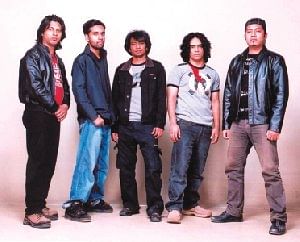 Why
are there so many frequent changes in the band line up? Don't you
think it affects the stability of the band?
Why
are there so many frequent changes in the band line up? Don't you
think it affects the stability of the band?
Right now the word "frequent" might not be appropriate for
us because we have become much more stable from 2001. You see Balam
on vocal from then and Sazzad on guitars from 2001. Shams and Balam
are also working full time from 1999 and Tipu is always there. The
only change we had most during these years was on bass but we are
sure Roger will not let us fall in the same problem for the that section.
What
would you call your type of music? (Its not heavy metal or hard rock)
The type of music Warfaze produces can be defined as hard-rock most
of the time with some progressive touch and also there are some tracks
can be defined as heavy-metal.
Well it can be said, that there is a collection of some rock-ballad
numbers.
Fame
doesn't bring fortune-are you guys facing this problem?
Actually most of our members are occupied with different works rather
than music…
So we can't apply this concept totally on our fortune...
What
do you think is the best Warfaze album of all time?
Every album is like a child to us and you know what it means to a
family. Warfaze always produced albums which are different from each
other. So each and every album is unique to us from different point
of views.
Where
do you like performing the most?
We like to perform most of the open- air concerts cause the weather
and ambience is "open air". And indoor venues like "Osmani"
have a very good acoustic sound. Also we find the shows very interesting
outside Dhaka.
Plans
for the future? What can Warfaze fans look forward to?
Right now we are working on best of Warfaze. The old tracks will be
done along with 3 or 4 new tracks. After releasing the best of Warfaze,
the next album will be released within 6 months. Also we are having
offers to do shows abroad which are on process right now.
Most
of our commercial rock bands seem to have gone on to the 'techno'
side so where do you think you will be 5 years from now?
Our style will always be ours, we've been around for a pretty long
time, and so if it would have changed don't you think it would have
by now??
Web:
www.onlywarfaze.com
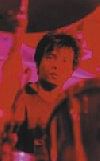 Tipu:
Band leader, Drums and percussion
Tipu:
Band leader, Drums and percussion
Full name: Sheikh Monirul Alam
Playing since: 1981
First performance: 1981
Date of birth: 1st July
Musical influences: Azam Khan, Deep Purple, Rainbow,
Iron Maiden, Metallica
Favourite bands: Dream Theatre, Yes, Four play
Side projects/other bands playing: Winning, Pentagon,
Renaissance, Bangla
X-bands: Pony, Stars
 Balam:
(Lead vocalist/Guitarist/Composer/Lyricist)
Balam:
(Lead vocalist/Guitarist/Composer/Lyricist)
Full name: Kazi Md. Ali Jahangir
Playing since: 1991
First performance: 1993
Date of birth: 24th December
Musical influences: Iron Maiden, Scorpions, White
Snake, Bon Jovi, Chicago
Favourite bands: Metallica, Whitesnake, Def Leppard,
Deep purple
Side projects/other bands playing: None
X-bands: Ranegadesh
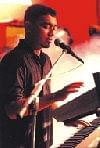 Shams:
(Keyboards/back up vocals/composer/lyricist)
Shams:
(Keyboards/back up vocals/composer/lyricist)
Full name: Shams Mansoor Ghani
Playing since: 1988
First performance: 1989
Date of birth: 16th June
Musical influences: Deep Purple, Pink Floyd, Metallica,
Dream theatre, Doors, Police
Favourite bands: Dream Theatre, Metallica, Pink Floyd
Side projects/other bands playing: keyboard instructional
session: Smooth Fingers Project
X-bands: Rhythm, Dhrubo
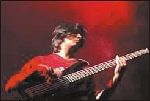 Roger:
(Bassist/Composer/Lyricist)
Roger:
(Bassist/Composer/Lyricist)
Full name: Naim Haque
Playing since: 1990
First performance: 1991
Date of birth: 17th January
Musical influences: Stuart Hamm, Flee, Victore Wooten,
Steeve Harris, John Myung.
Favourite bands: Metallica, Dream Theatre, Symphony-x,
Angra, Heloween, Death, Dokken, Mr.Big, Manowar.
Side projects/other bands playing: None
X-bands: Metal maze
 Sazzad:
(Guitarist/Backing vocals/Composer/Lyricist)
Sazzad:
(Guitarist/Backing vocals/Composer/Lyricist)
Full name: Khandokar Sazzadul Arefeen
Playing since: 1994
First performance: 1995
Date of birth: 29th January
Musical influences: Metallica, Pantera, Manowar,
Judas Priest, Dokken, Overkill
Joe Satriani, Marty Friedman
Favourite bands: Dokken, Scorpions, Sepultura, Slayer,
Dio
Side projects/other bands playing: None
X-bands: Metal maze

By
Niloy
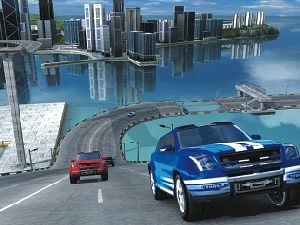 Remember
when you were a kid and you used to drive slot cars around wild tracks
at crazy speeds or see what sort of punishment your Matchbox cars
could take before they became unrecognizable hunks of metal? Nadeo's
TrackMania Sunrise will bring back those fond memories with its unique
brand of way-over-the-top arcade racing. Get ready to launch cars
across vast chasms or roar upside down through enormous loops at 400mph.
Remember
when you were a kid and you used to drive slot cars around wild tracks
at crazy speeds or see what sort of punishment your Matchbox cars
could take before they became unrecognizable hunks of metal? Nadeo's
TrackMania Sunrise will bring back those fond memories with its unique
brand of way-over-the-top arcade racing. Get ready to launch cars
across vast chasms or roar upside down through enormous loops at 400mph.
TrackMania Sunrise
encourages fast and precise driving, and they encourage it like no
other racing game on the planet. Your speed continues to increase
as long you go without taking your finger away from the accelerator
or brushing a wall, the exaggerated physics let you hang in the air
for ridiculous amounts of time and even apply the brakes slightly
to slow your aerial momentum, and questions of collisions with other
drivers and damage modelling never even arise. None of the main game
modes even treat the other cars as physical objects. You can drive
right through them. But I wouldn't have it any other way.
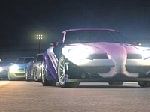 In
Platform, a gameplay mode now arguably my favourite, the goal is simply
to reach the finish line whilst resetting to a previous checkpoint
as few times as possible; the eventual goal is to complete the track
without resetting at all. Why would you reset? Because the tracks
are elaborate, rollercoastery affairs with enormous jumps, blind turns,
Tony Hawk-style half-pipe transfers over water, and fiendishly designed
hops, braking zones and other tricky sections that often demand thorough
investigation not to mention a great deal of determination to overcome.
Of all the modes, Platform best illustrates how Sunrise becomes a
game of instinctive high-speed reactions, and how players quickly
gets used to things like the weight distribution and mannerisms of
the vehicles and the world, and quickly come to love them.
In
Platform, a gameplay mode now arguably my favourite, the goal is simply
to reach the finish line whilst resetting to a previous checkpoint
as few times as possible; the eventual goal is to complete the track
without resetting at all. Why would you reset? Because the tracks
are elaborate, rollercoastery affairs with enormous jumps, blind turns,
Tony Hawk-style half-pipe transfers over water, and fiendishly designed
hops, braking zones and other tricky sections that often demand thorough
investigation not to mention a great deal of determination to overcome.
Of all the modes, Platform best illustrates how Sunrise becomes a
game of instinctive high-speed reactions, and how players quickly
gets used to things like the weight distribution and mannerisms of
the vehicles and the world, and quickly come to love them.
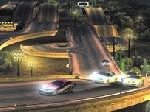 In
the Puzzle mode, where you're given a track setting with start and
finish points and checkpoints and then have to use various prescribed
track pieces to design the most efficient route possible, before entering
the game world and trying to achieve a particular lap time. Normally
there's an obvious strategy that yields bronze and perhaps silver
medals, but there's usually a more devilish approach that has to be
puzzled out to achieve a gold, and for this you'll have to use the
editor to exploit the game's fondness for aerial activity amongst
other things.
In
the Puzzle mode, where you're given a track setting with start and
finish points and checkpoints and then have to use various prescribed
track pieces to design the most efficient route possible, before entering
the game world and trying to achieve a particular lap time. Normally
there's an obvious strategy that yields bronze and perhaps silver
medals, but there's usually a more devilish approach that has to be
puzzled out to achieve a gold, and for this you'll have to use the
editor to exploit the game's fondness for aerial activity amongst
other things.
Then there is
the Crazy mode which will take you a while to unlock, but when you
do it, it's worth the trouble. The idea here is that you're given
a certain amount of time - say five minutes - in which to complete
as many laps of the track as possible. Complete four for bronze, ten
for silver, etcetera. But completed laps are only recorded toward
your total if you finish them within the prescribed time limit, which
decreases each time you complete a successful lap. It soon becomes
frantic, as errors creep into your repeated sorties through the same
obstacles and margin for error narrows, and in a nice touch there
are also 15 ghost cars zooming along the same path to throw you off.
If they do though, you only have yourself to blame; after a while
each track's ghost selection is largely populated by replays of your
own previous laps, including those you recorded as part of the same
attempt.
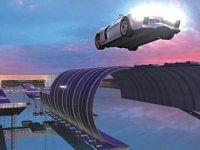 The
time trial-styled Race mode, finally, may seem the most familiar,
with the goal simply being to reach the finish line in a certain time
to win a medal - the route for each of which is played out alongside
you by ghost cars, occasionally cluing you in to shortcuts. But in
practice it's similarly unique to the others, with enormous, spiralling,
loop-the-looping, twisty-turny tracks where blind turns and deceptive
jumps are rarely as prevalent as they are in the Platform mode, but
the sense of speed and urgency combined with the frantic, last-minute
adjustments often necessary before huge jumps offer a compensatory
boost of adrenaline.
The
time trial-styled Race mode, finally, may seem the most familiar,
with the goal simply being to reach the finish line in a certain time
to win a medal - the route for each of which is played out alongside
you by ghost cars, occasionally cluing you in to shortcuts. But in
practice it's similarly unique to the others, with enormous, spiralling,
loop-the-looping, twisty-turny tracks where blind turns and deceptive
jumps are rarely as prevalent as they are in the Platform mode, but
the sense of speed and urgency combined with the frantic, last-minute
adjustments often necessary before huge jumps offer a compensatory
boost of adrenaline.
Keeping things
fresh as you progress through the cups are a number of different car
types. Some are sleeker and faster than others, while others have
bouncier suspension and better traction, or prove themselves to be
lumbering and slow to accelerate. Some can frustrate. But instead
of some being worse than others, they all eventually come to represent
a difference of approach and reinvention - in the same way that the
developers unlocks new levels where the playing conditions are so
dramatically different that it can feel like a different game each
time.
Visually it's
incredibly clean and well defined, and manages to uphold a ridiculously
high level of detail and still requires an impressively low system
specs - watch out for the moisture on the road surface as the camera
pans to catch the sun's reflection in it, and the use of mesh-like
road surfaces to increase the amount of things being thrust into your
brain at any given moment exponentially - and yet it doesn't sacrifice
the immediacy of restarts. One of the key components of Sunrise's
compelling nature is that hitting Enter brings you back to the last
checkpoint like a snap of the fingers and the same is true of hitting
Delete to take you back to the starting point. In other words, the
game must somehow cache all of this detail for instant access. When
you've seen it in motion you'll wonder how on earth it's done.
Granted, the game
is undeniably frustrating, but it's also utterly compelling. The concept
is so simple and elegant, the design of the tracks so intelligent,
the restarts so immediate, that even when you're plugging away at
the same section repeatedly it feels like one continuous challenge.
You can argue that the relentless "try, try and try again"
repetition won't appeal to everyone, but it's a different kind of
repetition to the soul-destroying grind of so many modern games.

Review
by Gokhra
The
Pacifier boldly goes where no Navy Seal movie has gone before. It
has a funny casting full of oddball characters in skewed real life
situations. There is one tough as nails Navy Seal commando Shane Wolfe
(Vin Diesel) who goes from handling guns to handling diapers.
The plot: Diesel
plays Shane Wolfe, a hard-edged commando who gets into an even harder
job. That is he has to baby sit a bunch of kids.
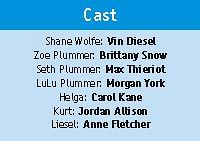 We
are given an intro to Wolfe before the titles start rolling. He and
three other scuba-diving SEALs shoot down a helicopter, wipe out four
gunmen on jet skis, bomb a boat, and rescue Plummer, an American scientist
kidnapped by Serbians.
We
are given an intro to Wolfe before the titles start rolling. He and
three other scuba-diving SEALs shoot down a helicopter, wipe out four
gunmen on jet skis, bomb a boat, and rescue Plummer, an American scientist
kidnapped by Serbians.
Anyway. One thing
leads to another, and soon Wolfe gets the babysitting assignment so
that Plummer's five children can be protected. You see, the terrorists
want "Ghost," the scientist's foolproof encryption key.
What's worse is that the scientist used the names of his children
as the password for his locked briefcase.
In the meantime
Plumers wife and a Navy intelligence officer go to Geneva to open
his safety deposit box. They're supposed to be gone only a couple
of days, but one week follows another as they unsuccessfully try to
guess the password. From time to time the movie cuts to a Swiss bank,
where two executives wait patiently while the wife and the Navy guy
try one word after another. The Swiss banking executives seem to have
a lot of time on their hands as they wait around. Probably they worked
as Bangladeshi government officials at some point of time.
So what is Wolfe
left with? There's an unhappy teenage boy, a boyfriend-crazy teenage
girl and two noisy kids. Because he is not good at names, he tags
them the Red Team, and calls them "Red One," "Red Two,"
and so on. They do not much take to this, and make his life a living
hell.
That sounds like
a good enough beginning to a funny conclusion but things do become
a bit predictable. We know that the kids hate Wolfe at first but then
they will bond and become all decent. Personal problems as well as
international problems will be solved within the end of the stipulated
tw weeks or so with the help of Wolfes unorthodox ways.
In a subplot Seth,
the older Plummer boy, wants to be an actor, despite the kidding he
gets at high school. He's appearing in a production of "The Sound
of Music," where he keeps fouling up. The play's director also
decides to walk off the job leaving Shane Wolfe to take over the direction.
Muscle man and little man have a heart to heart where the kid is is
told to follow his dream of becoming an actor if that's what will
make him happy.
 Meanwhile,
Wolfe is also supposed to be guarding the kids against loads of Serbian
and probably North Koreans. Comic action sequences flow in a loaded
supermarket. Also he is also challenged to a wrestling match with
a coach who is more than strange. It all leads to the part where the
safe deposit box is unlocked, the secrets are safe and evey one is
left smiling (except for the bad guys).
Meanwhile,
Wolfe is also supposed to be guarding the kids against loads of Serbian
and probably North Koreans. Comic action sequences flow in a loaded
supermarket. Also he is also challenged to a wrestling match with
a coach who is more than strange. It all leads to the part where the
safe deposit box is unlocked, the secrets are safe and evey one is
left smiling (except for the bad guys).
The verdict: As
I said before the movie goes along being a little predictable. You
know everything will work out in the end. But that is not a bad thing.
There's plenty of comic
moments to have
you laughing along. Vin Diesel does an excellent job of sowing that
he's not just only good enough for blowing up things. His deadpan
gravelly voice can do wonders for dry humour. The movie is an entertainer
with lots of action interspersed with drama and the all important
comedy.
